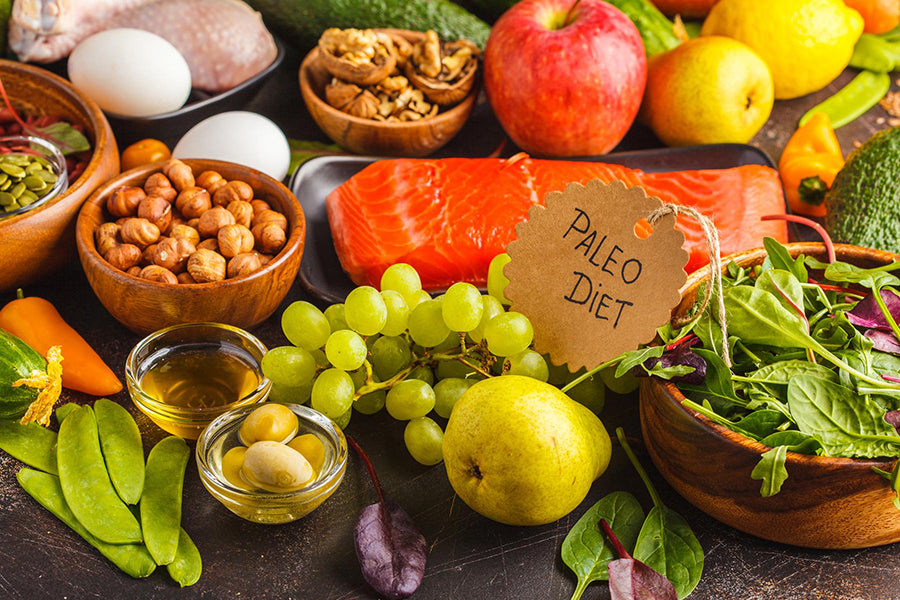Confused and exhausted with the endless skimming of weight-loss strategies and diet plans? Well, we all are and for all the right reasons. But worry not, this article will relieve you of the agony of finding the right meal plan to shed those stubborn pounds.
If you're like most people, you probably skimmed through the Paleo Diet, thinking of it as a fad diet. But the truth is, it is a healthy, sustainable way of eating that can help you shed off weight, feel great, and get in shape.
The Paleo Diet is based on the idea that we should eat as our Paleolithic ancestors did. That means eating many fresh fruits and vegetables, lean protein, and healthy fats. It also means avoiding processed foods, sugary drinks, and unhealthy snacks.
Paleo or Paleolithic diet takes you to revisit the eating style and habits of an era 2 million years ago. Since our genetics and anatomy have changed since the Stone Age, we must eat the food of that time that promotes good health.
Our predecessors used to hunt, fish, and gather wild plants to eat. Since these simpler times led to eating more organic food, they lived longer and were less likely to contract diseases. The intake of lean meats, plant foods, and a high level of physical activity resulted in higher life expectancy than today.
The Implementation of Paleo Diet
This diet hosted its peak popularity in 2014 when consumers realized the benefits of eating healthier food and knowing where their food is coming from.
The diet advocates cutting out dairy, legumes, and grains from your diet and targets the increase of whole foods, fruits, vegetables, healthy proteins, and healthy fats in your intake.
Since the diet is referred to as a caveman or Stone-Age diet, its proponents focus on low-glycemic fruits and vegetables. However, the variety of foods available at that time, the variations in the diet as per various regions, and the modern-day fruits and vegetables' resemblance to the foods of prehistoric versions are still under debate.
Due to these disagreements, there isn't one single true paleo diet available. For example, the Paleo diet excludes white potatoes due to their high glycemic index which was available in prehistoric times. On the other hand, earlier times did not include frozen foods, but the Paleo diet encourages them to preserve nutrients.
Overall the Paleo diet is high in proteins, moderate-low in carbohydrates, and low on fats. It is surged with fiber but low on sodium and refined sugars. The diet does not emphasize counting calories and defining portions of food. Some Paleo meals allow cheat meals in a week for better compliance as well.
Science-Backed Benefits of Paleo Diet
It is widely believed that the change from a hunter-gatherer style diet to a modern agricultural diet has increased the likelihood of many chronic diseases, including heart disease, diabetes, and obesity.
Switching to the Paleo diet leads to many positive changes that improve the overall quality of life. Some significant benefits are listed below:
- Promotes healthy blood glucose
- Improves insulin sensitivity
- Lowers mortality rates
- Improves weight management
- Enhances cholesterol levels
- Ensures better satiety
People who follow the Paleo diet have reported improvements in inflammation, focus, and sleep. Weight loss has also been concluded through various studies. A study said that people who followed a Paleolithic diet witnessed a weight loss of 3.52 kilograms, reduced waist circumference, and body mass index.
You can combine the diet with the Fat Burner supplement by DMoose to boost the fat metabolism and witness swift results.
Related Article: Ten Weight Loss Tips to Swear by!
A weight-loss expert Carissa Alinat visited Critical Bench to discuss how the Paleo Diet can be beneficial for losing weight. She shared her personal experience of how cutting out overly processed foods helped her maintain her weight over the years after losing 70lbs.
Another study published in Nutrition Journal reinforced the benefits of the Paleo diet. It randomized control trials to establish a relationship between the Paleo diet and the prevention of chronic diseases.
A 2020 meta-analysis compared the Paleo diet with the Mediterranean diet, diabetes diet, etc. The review focused on the studies' impact on glucose and insulin levels in different individuals. Researchers reported that the Paleo diet does not lead to any substantial improvements in glucose, insulin, or HbA1c levels compared to other diets.
Another study reported that individuals who follow Paleo or Mediterranean diet had reduced all-cause mortality rates, lowered oxidative stress, and minimized the likelihood of mortality due to heart disease or cancer.
Foods Allowed on the Paleo Diet
You can consume the following foods when you are on the Paleo diet:
Grass-Fed Meat
Choosing grass-fed is healthier for you, the environment, closer to what our ancestors ate, and richer in omega-3 fatty acids. You can eat beef, chicken, lamb, bacon, and turkey.
When looking for chicken, try to get one raised without antibiotics. Instead, try to source it straight from the farm and learn how it was raised.
Fish and Seafood
Salmon, shrimp, shellfish, trout, etc., are all safe to consume. Try to choose wild-caught. If wild-caught seafood isn't a viable option for you, try to get your hands on wild salmon or sustainably-caught seafood.
Fresh Fruits
Apples, bananas, oranges, avocadoes, strawberries, blueberries, etc., can be a part of your diet without a doubt. Since fruits are unprocessed, make sure they make up for a large chunk of your diet.
Veggies
Broccoli, kale, carrot, spinach, tomatoes, onions, etc., are all vegetables you can consume. Make them a considerable part of your diet since these are not processed. Frozen vegetables without added sauce are also Paleo.
Eggs
Try to choose omega-3 enriched eggs. You'll find it in organic eggs that are taken from chickens raised cage-free. Since eggs are high in protein, minerals, vitamin B, and antioxidants, they should be a staple part of the diet. DMoose offers Omega-3 fish oil supplement to enhance your omega-3 intake and promote a healthy mental and physical health.
Nuts and Seeds
You can load up your cart with almonds, walnuts, hazelnuts, macadamia nuts, cashews, etc. Since these were foraged in prehistoric times, they are super healthy. As they are loaded with fiber, healthy fats, and proteins, you can eat them in a handsome amount. Peanuts are also part of the Paleo diet since they are legumes.
Healthy Oils
Loren Cordain, Ph.D., founder of the Paleo Diet Movement, breaks down which oils are healthier for consumption. Olive, walnut, flaxseed, macadamia, avocado, coconut, etc., are all gathered directly from the plant and hence are part of the diet. Our predecessors did not consume flaxseed oil, but since it's a heart-healthy oil with anti-inflammatory properties, it's a part of the diet.
Salt and Spices
Garlic, turmeric, rosemary, parsley, sea salt, etc., can all be used to season your meals.
Related Article: Vitamins and Minerals That You Should Take Daily
Foods to Avoid on the Paleo Diet
- Sugar and high-fructose corn syrup
- Grains
- Legumes
- Dairy
- Some vegetable oils
- Trans fats
- Artificial sweeteners
- Highly processed foods
A simple guide to deciding whether you should eat it or not is to check if it was produced at the factory. If it was, don't consume it. Everything that's highly processed is not healthy. Make sure to read the ingredients list whenever you are out grocery shopping to purchase the right thing.
Our diet should strictly consist of nutritious food items. Everything that's unhealthy should be restricted. On the other hand, if you feel unsure about any legume or grain, get in touch with a registered dietitian to determine that's the best.
Related Article: Junk Food Makes You Miserable - It's Time to Ditch Junk Food
Sample Paleo Menu for One Week
This sample plan constitutes all the paleo-friendly food items used in a perfect balance for your routine. Of course, you can adjust the plan as per your preferences as long as it's healthy.
Monday
- Breakfast: Eggs and vegetables made in olive oil. Take one fruit
- Lunch: Chicken salad with olive oil. A handful of nuts
- Dinner: Burgers without bun, fried in butter, with vegetables and some salsa
Tuesday
- Breakfast: Bacon and eggs, with one fruit
- Lunch: Leftover burgers from the night before
- Dinner: Salmon fried in butter, with vegetables
Wednesday
- Breakfast: Meat with vegetable leftovers from last night
- Lunch: Sandwich made in a lettuce leaf, meat, and some fresh vegetables
- Dinner: Ground beef stir-fry with some fresh vegetables. Take some berries along with it
Thursday
- Breakfast: Eggs with a fruit of your choice
- Lunch: Leftover stir-fry from last night along with a handful amount of nuts
- Dinner: Fried pork with a portion of vegetables
Friday
- Breakfast: Eggs and vegetables made in olive oil
- Lunch: Chicken salad with olive oil and a handful of nuts
- Dinner: Steak with a side of vegetables and sweet potatoes
Saturday
- Breakfast: Bacon and eggs with a fruit of your choice
- Lunch: Leftover steak and vegetables from last night
- Dinner: Baked salmon with vegetables and avocado
Sunday
- Breakfast: Meat with vegetable leftovers from last before
- Lunch: Sandwich made in a lettuce leaf, meat, and fresh vegetables
- Dinner: Grilled chicken wings with a side of vegetables and salsa sauce
Final Thoughts
The Paleo diet keeps you close to your roots and ensures organic consumption. It includes all the healthy items for your body and prevents chronic diseases from increasing your life expectancy as that of your predecessors. It's an excellent way to lose weight, lower insulin, blood glucose, and cholesterol levels.
To follow a proper diet, one must be fully aware of the items they are allowed to consume and the strictly prohibited ones. Make sure your meals do not consist of legumes, grains, dairy, artificial sweeteners, and processed foods. Scan through the ingredient list of every item you purchase to ensure what you're purchasing aligns with the health index of the diet. When it comes to a longer and healthier life, Paleo is your definite answer!








